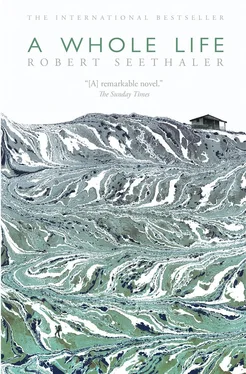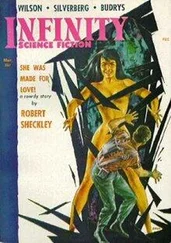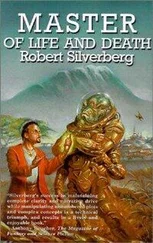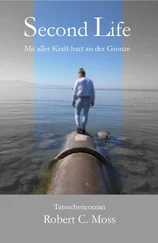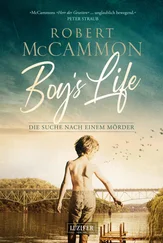Robert Seethaler - A Whole Life
Здесь есть возможность читать онлайн «Robert Seethaler - A Whole Life» весь текст электронной книги совершенно бесплатно (целиком полную версию без сокращений). В некоторых случаях можно слушать аудио, скачать через торрент в формате fb2 и присутствует краткое содержание. Год выпуска: 2015, Издательство: House of Anansi Press Inc, Жанр: Современная проза, на английском языке. Описание произведения, (предисловие) а так же отзывы посетителей доступны на портале библиотеки ЛибКат.
- Название:A Whole Life
- Автор:
- Издательство:House of Anansi Press Inc
- Жанр:
- Год:2015
- ISBN:нет данных
- Рейтинг книги:4 / 5. Голосов: 1
-
Избранное:Добавить в избранное
- Отзывы:
-
Ваша оценка:
- 80
- 1
- 2
- 3
- 4
- 5
A Whole Life: краткое содержание, описание и аннотация
Предлагаем к чтению аннотацию, описание, краткое содержание или предисловие (зависит от того, что написал сам автор книги «A Whole Life»). Если вы не нашли необходимую информацию о книге — напишите в комментариях, мы постараемся отыскать её.
Set in the mid-twentieth century and told with beauty and tenderness, his story is one of man's relationship with an ancient landscape, of the value of solitude, the arrival of the modern world, and above all, of the moments, great and small, that make us who we are.
A Whole Life — читать онлайн бесплатно полную книгу (весь текст) целиком
Ниже представлен текст книги, разбитый по страницам. Система сохранения места последней прочитанной страницы, позволяет с удобством читать онлайн бесплатно книгу «A Whole Life», без необходимости каждый раз заново искать на чём Вы остановились. Поставьте закладку, и сможете в любой момент перейти на страницу, на которой закончили чтение.
Интервал:
Закладка:
‘Understood,’ said Egger, and felt again the subtle pain near his heart. There are no lies before God, he thought, but there are before an innkeeper.
He waited for her after church on Sunday. She was wearing a white dress and had a little white hat on her head. Although this little hat looked very pretty, Egger thought perhaps it was slightly too small. He was reminded of the rootstocks that protruded darkly here and there from the forest floor and on which, from time to time, a single white lily would bloom, like a miracle. But perhaps the little hat was just right; Egger didn’t know. He had no idea about these things. His experiences of women were limited to church services, during which he would sit in the very back row of the chapel listening to their high, clear voices, practically anaesthetized by the Sunday scent wafting from hair that had been washed with soap and rubbed with lavender.
‘I would like…’ he said roughly, and broke off in mid-sentence, having suddenly forgotten what it was he actually wanted to say. They stood for a while in silence in the shadow of the chapel. She looked tired. Her face still seemed veiled by the twilight of the church’s interior. A yellow speck of pollen clung to her left eyebrow, quivering in the breeze. Suddenly she smiled at him. ‘It’s getting chilly,’ she said. ‘Maybe we could walk in the sun for a bit.’
They walked side by side along the forest path that wound up from behind the chapel to the Harzerkogl. A little stream trickled in the grass and the treetops rustled above them. Everywhere in the undergrowth they could hear the chirping of robins, but whenever they came too close the birds fell silent. They reached a clearing and stopped. High above their heads a falcon hung motionless. Suddenly it flapped its wings and tipped sideways; it seemed simply to fall from the sky and vanish from their sight. Marie picked some flowers and Egger hurled a stone the size of a head into the undergrowth, on impulse, just because he had the inclination and the strength to do it. As they were crossing a rotten footbridge on the way back she grasped his forearm. Her hand was rough and warm like a piece of sunlit wood. Egger would have liked to place it against his cheek and simply stop and stand there. Instead he took a big step and walked swiftly on. ‘Be very careful,’ he said, without turning to look at her. ‘You can easily twist an ankle on this ground.’
They met every Sunday, and sometimes, later on, during the week as well. As a small child, climbing over a rickety wooden fence, she had fallen into the pigsty and been bitten by a startled mother sow. Ever since, she had had a bright red scar across the nape of her neck, about twenty centimetres long and shaped like a crescent moon. It didn’t bother Egger. Scars are like years, he said: one follows another and it’s all of them together that make a person who they are. Marie, for her part, wasn’t bothered by his crooked leg. At least, she didn’t say anything. She never mentioned his limp, not with so much as a word. But then the two of them didn’t talk much. They walked alongside each other, contemplating their shadows on the ground before them, or sat on a rock somewhere and gazed across the valley.
One afternoon towards the end of August he took her up to his plot of land. He bent down, opened the little wooden gate and stood back for her to enter. He still had to paint the cabin, he said; wind and damp gnawed through wood before you knew it, you see, and then you could forget all about being snug. Over there he’d planted a few vegetables, celery for example, already almost as high as your head. The sun shone more brightly up here than down in the valley, you see. Which wasn’t just good for the plants; it warmed the bones and the spirit, too. Not to mention the view, of course, said Egger, with a sweep of his arm; you could see right across the whole region, even further when the weather was good. He wanted to paint inside as well, he explained to her, with masonry paint. You had to dilute it with fresh milk instead of water, of course, to make it last. And the kitchen still needed to be properly equipped, but at least the essentials were already there, pots, plates, cutlery and things, and when he had a chance he’d sand down the frying pans as well. He wouldn’t need a shed, incidentally, because he didn’t have either the space or time for cattle; after all, he didn’t want to be a farmer. Being a farmer meant spending your whole life crawling around on your clod of land with your eyes lowered, scratching at the earth. His kind of man needed to lift up his eyes and look as far as possible beyond his own small, limited patch of ground.
In later life Egger couldn’t remember ever having talked as much as he did the day Marie first visited his cabin. The words simply tumbled out of him and he listened to them in astonishment as they lined up, seemingly of their own accord, to create a meaning that became apparent to him with surprising clarity only after he had spoken them.
As they descended the narrow, winding path to the valley, Egger fell silent again. He felt strange and a little embarrassed, without knowing why. They stopped for a while at a bend in the path, sat in the grass and leaned their backs against the trunk of a fallen beech. The wood had stored the warmth of the last days of summer and smelled of dry moss and resin. All around them the mountaintops rose up into the clear sky. Marie thought they looked as if they were made of porcelain, and although Egger had never seen porcelain in his life he agreed with her. You’d have to be careful walking there, he said; one false step and the whole landscape might crack, or shatter straight away into thousands of tiny landscape-splinters. Marie laughed. ‘That sounds funny,’ she said.
‘Yes,’ said Egger. Then he bowed his head, not knowing what to do next. He would have liked to stand up, grab a rock and fling it somewhere at random, as high and as far as possible. Suddenly he felt her shoulder against his shoulder. He raised his head and said, ‘I can’t stand it any longer!’ He turned towards her, took her face in both hands and kissed her.
‘Goodness,’ she said. ‘Aren’t you strong!’
‘Sorry,’ he said, alarmed, and drew back his hands.
‘It was nice, though,’ she said.
‘Even though it hurt?’
‘Yes,’ she said. ‘Very nice.’
He took her face in his hands once more, this time as gently as you would cradle a hen’s egg or a newly hatched chick.
‘That’s right,’ she said, and closed her eyes.
He would have liked to ask for her hand that very day, or the following day at the latest, but he had no idea how to go about it. For nights on end he sat in front of his house on the threshold he had built, staring at the moonlit grass at his feet while his thoughts revolved around his own inadequacies. He wasn’t a farmer, and he didn’t want to be one. But he wasn’t a craftsman either, or a woodsman, or a herdsman. In truth, he made his living as a kind of labourer, a hired hand for all seasons and occasions. A man like that was good for pretty much anything, but not as a prospective husband. Women expected more from a husband-to-be: this much Egger thought he did understand about them. If it were up to him he would spend the rest of his life sitting beside a path somewhere, hand in hand with Marie, leaning against a resinous tree trunk. But it wasn’t just up to him now. He knew his responsibilities in this world. He wanted to protect Marie and take care of her. A man needed to lift up his eyes and look as far as possible beyond his own small, limited patch of ground. That was what he had told her, and that was what he intended to do.
Egger paid a visit to the camp of Bittermann & Sons, which by now had expanded to cover the whole of the sloping meadow on the other side of the valley, and had more inhabitants than the village itself. He asked his way to the hut of the general manager, who was responsible for hiring new workers, and entered his office with unaccustomed hesitancy: he was afraid his rough boots might damage the carpet, which covered practically the whole of the floor and muffled his steps as if he were walking on moss. The general manager was a heavy man whose bald, scarred head was fringed with a crown of short-cropped hair. He was sitting behind a black wooden desk wearing a leather jacket lined with sheepskin, despite the warmth in the room. He was poring over a stack of files and seemed not to have noticed Egger’s entrance, but just as Egger was about to make some sort of noise to attract his attention he unexpectedly raised his head.
Читать дальшеИнтервал:
Закладка:
Похожие книги на «A Whole Life»
Представляем Вашему вниманию похожие книги на «A Whole Life» списком для выбора. Мы отобрали схожую по названию и смыслу литературу в надежде предоставить читателям больше вариантов отыскать новые, интересные, ещё непрочитанные произведения.
Обсуждение, отзывы о книге «A Whole Life» и просто собственные мнения читателей. Оставьте ваши комментарии, напишите, что Вы думаете о произведении, его смысле или главных героях. Укажите что конкретно понравилось, а что нет, и почему Вы так считаете.
